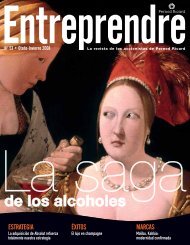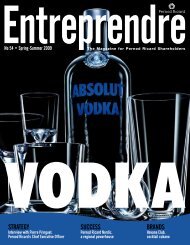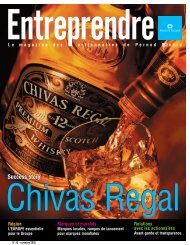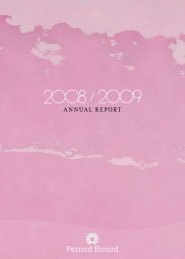Registration Document - Pernod Ricard
Registration Document - Pernod Ricard
Registration Document - Pernod Ricard
Create successful ePaper yourself
Turn your PDF publications into a flip-book with our unique Google optimized e-Paper software.
3 Risk<br />
60<br />
MANAGEMENT REPORT<br />
factors<br />
Risk factors<br />
Risks in connection<br />
with business activity<br />
Risks relating to the global economic<br />
environment<br />
<strong>Pernod</strong> <strong>Ricard</strong> is co-leader of the global Wine and Spirits market.<br />
It sells products in 70 countries, via distribution subsidiaries or,<br />
in smaller markets, third-party distributors.<br />
In most countries, the consumption of Wine and Spirits , closely linked<br />
to the broader economic environment tends to decline during periods<br />
of economic recession, falling revenues, higher cost of living and<br />
inflation. Wine and S pirits consumers also have the option of trading<br />
down to less costly product categories (“standard” as opposed to<br />
“P remium” products) when the economic environment is depressed.<br />
While the Group’s business has held up well during the current crisis,<br />
it is nonetheless exposed to the consequences of economic downturns<br />
and the possibility of more muted growth in consumption, particularly<br />
in North America and some European countries.<br />
Despite the fact that the diversified geographical spread of the Group’s<br />
activities can help smooth out difficulties encountered in specific<br />
markets, there is a risk that global recessions or severe contractions<br />
in our leading markets could have an adverse impact on our sales,<br />
sparking a deterioration in our earnings and outlook.<br />
Risks relating to seasonal trends<br />
<strong>Pernod</strong> <strong>Ricard</strong> makes an above-average portion of its sales during<br />
the Christmas and New Year season (November, December) and the<br />
Chinese New Year (January, February). This means that an event<br />
occurring during these periods could prompt a reduction in the<br />
Group’s revenues and a deterioration in its full-year earnings.<br />
Risks relating to competition<br />
The Group is present in fiercely competitive markets, where brand<br />
recognition, corporate image, price, product quality, D istribution<br />
N etwork and services provided to consumers are differentiating<br />
factors.<br />
While the Group aims constantly to strengthen the recognition of its<br />
brands, particularly its 15 strategic brands, via advertising campaigns<br />
and promotions, to enhance the quality of its products and to<br />
optimise its distribution and service networks, it must also face up<br />
to heightened competition from major international players on its<br />
international brands and from smaller groups or local producers on<br />
its local brands.<br />
The fierce competition prevailing in mature markets and the<br />
increasingly competitive nature of the emerging markets could oblige<br />
the Group to boost its investments and advertising expenditure, or<br />
even to cut its prices in order to defend its market share.<br />
PERNOD RICARD<br />
The Group is dependent on third parties<br />
for the distribution and, in some cases,<br />
for manufacturing of its products<br />
in a number of key markets<br />
The Group has signed agreements with third parties covering the<br />
distribution and, in some cases, the manufacturing of its products in<br />
a number of key markets. It also distributes brands belonging to other<br />
groups via its global Wine and Spirits distribution network. These<br />
include Four Roses American whiskey, Sandeman ports and sherries,<br />
and Polish vodka Zubrowka, for which the Group has distribution<br />
rights covering more than 70 countries.<br />
The terms of these agreements vary for each brand, but are generally<br />
signed for a specific number of years. The termination of some of<br />
these contractual relationships could block access for consumers to<br />
the relevant products, which could be prejudicial to the Group’s shortand<br />
long-term performances.<br />
The Group is not in a position to guarantee that it will be able, when<br />
such contracts expire or are terminated, to renegotiate distribution or<br />
manufacturing rights on favourable terms. The impact on the Group’s<br />
sales and earnings, should it be unable to renegotiate distribution<br />
agreements on favourable terms when they expire, could be negative<br />
on its sales and earnings. The Group’s sales could also be adversely<br />
affected by any conflicts arising with its third-party distributors or<br />
the makers of its products.<br />
Further consolidation among spirits<br />
producers or merchants could hamper<br />
the distribution of the Group’s products<br />
The consolidation of distributors and merchants has not in the past<br />
had an adverse impact on the Group’s Wine and Spirits activities.<br />
However, further consolidation among foreign spirits producers<br />
and merchants in the Group’s key markets could potentially hamper<br />
the distribution of its products due to (i) less attention and fewer<br />
resources for its brands, and (ii) the lesser importance of the Group’s<br />
brands in the third party’s sales and/or a change in the competitive<br />
environment. Change of this nature could have an adverse impact on<br />
the Group’s reported results or outlook in these markets.<br />
Risks relating to the Group’s geographic<br />
footprint<br />
The Group derives a considerable portion of its sales from emerging<br />
markets in Asia, Latin America, and Central and Eastern Europe (Brazil,<br />
Russia, India and China for instance). The Group’s operations in these<br />
countries are exposed to political and economic risk, including risks<br />
relating to change in government policy.<br />
The Group is accordingly subject to a number of risks stemming from<br />
exchange-rate controls, change in exchange rates, inflation, problems<br />
with the repatriation of foreign earnings, dividends and investment<br />
capital, as well as political instability in these countries.<br />
I REFERENCE DOCUMENT 2008/2009 I
















